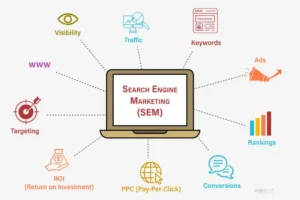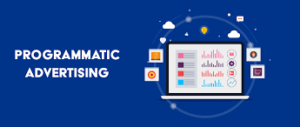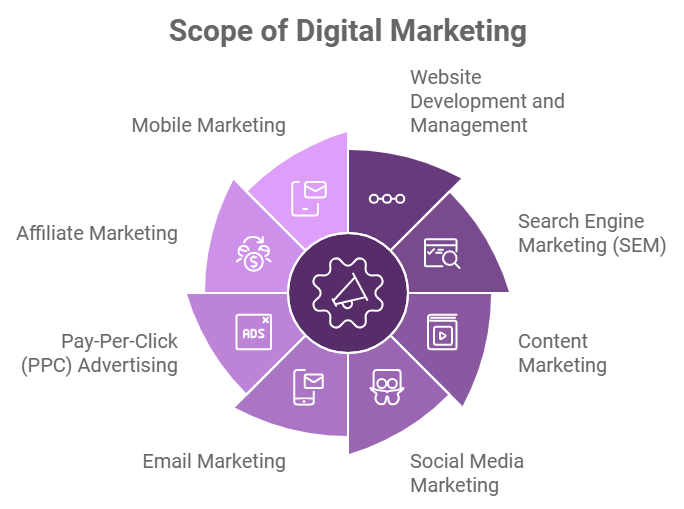The scope of digital marketing is vast and continuously expanding as technology evolves and businesses increasingly rely on online channels to connect with their target audience. Below are key areas and aspects that define the scope of digital marketing:
1. Search Engine Optimization (SEO)

Search Engine Optimization (SEO) is the process of optimizing a website to improve its visibility and ranking in search engine results pages (SERPs). The goal is to drive organic (non-paid) traffic by ensuring that the website aligns with search engine algorithms and user search intent
2. Search Engine Marketing (SEM)

Search Engine Marketing (SEM) is a digital marketing strategy that focuses on increasing the visibility of websites in search engine results pages (SERPs) through paid advertisements. SEM combines paid search strategies like Pay-Per-Click (PPC) advertising and organic search tactics to drive targeted traffic to a website.
3. Content Marketing
Creating and sharing valuable content to attract and retain an audience.
Formats include blogs, articles, videos, podcasts, and eooks.
4. Social Media Marketing (SMM)

Leveraging social media platforms (e.g., Facebook, Instagram, Twitter, LinkedIn) to engage with users and promote products or services.
Includes organic and paid advertising campaigns.
5. Email Marketing
Involves newsletters, promotional emails, and automated workflows.
6. Affiliate Marketing
Partnering with affiliates to promote products or services in exchange for a commission on sales or leads generated.
7. Influencer Marketing
Collaborating with influencers who have a strong online presence to endorse products or services.
Focuses on leveraging trust and reach of influencers in specific niches.
8. Video Marketing

Using video content on platforms like YouTube, Instagram, or TikTok to drive engagement and brand awareness.
Includes tutorials, product demos, testimonials, and live streams.
9. Mobile Marketing
Optimizing campaigns for mobile devices, including SMS marketing, app-based marketing, and mobile-friendly web experiences.
10. Analytics and Data Analysis
Using tools like Google Analytics, Adobe Analytics, or other platforms to track and analyze campaign performance.
Focus on metrics like ROI, click-through rates, and customer behavior to refine strategies.
11. Conversion Rate Optimization (CRO)

Enhancing website and landing page experiences to improve the percentage of visitors who complete desired actions (e.g., purchasing, subscribing).
12. E-commerce Marketing
Promoting online stores through digital channels.
Focuses on driving traffic to e-commerce sites and increasing conversions.
13. Online Reputation Management (ORM)

Online Reputation Management (ORM) refers to the process of monitoring, influencing, and maintaining an individual’s or organization’s reputation across digital platforms. ORM focuses on shaping public perception by addressing negative content, promoting positive feedback, and ensuring that online search results reflect a favorable image
14. Programmatic Advertising

Programmatic Advertising is the automated process of buying and selling digital ad space using algorithms and data insights. Unlike traditional methods that involve manual negotiations, programmatic advertising uses technology platforms to streamline ad buying, targeting, and placement in real time. It ensures ads are displayed to the right audience, at the right time, and on the right platforms.
15. Artificial Intelligence and Automation in Marketing

Leveraging AI for chatbots, predictive analytics, personalized content, and automated campaign management.
16. Future Trends
Voice search optimization.
Virtual Reality (VR) and Augmented Reality (AR) marketing.
Blockchain for secure transactions and transparency in digital ads.
Sustainability-focused campaigns to align with consumer values.
Importance of Digital Marketing:
Cost-Effective: Lower cost compared to traditional marketing methods.
Global Reach: Enables businesses to target audiences across geographical boundaries.
Real-Time Interaction: Facilitates instant feedback and engagement.
Measurable Results: Offers detailed metrics for campaign performance.
Industries Benefiting from Digital Marketing:

